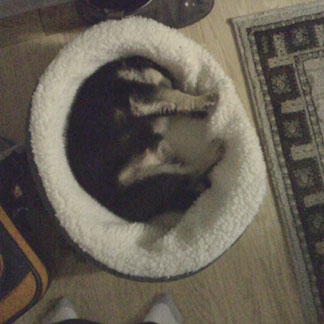Parvovirus and Your Dogs and Puppies
Parvovirus: One of the most contagious and potentially deadly viruses that dogs can become infected with is the parvovirus (parvo). This is a virus that seems to run in cycles all year round.
The virus is highly contagious to other dogs, and is mainly spread through contact with infected feces and saliva. Studies have shown it to remain in different environments or on the ground for up to a year.
This virus actually affects the intestines of the infected animal - the gastrointestinal system in un-vaccinated dogs and puppies. Dogs which are allowed to run loose outdoors are at the greatest risk since they may easily come in contact with other infected dogs or may pass through areas where the virus may still be active.
Typically Parvo affects puppies between 6-20 weeks of age since their immune systems have not developed fully. The infected dog will basically bleed to death internally and can die from severe pain and/or dehydration if treatment is not started in time.
The signs of parvo include the following: depression, lack of appetite, dehydration, fever, vomiting, and bloody and/or watery diarrhea. Getting your dog to the veterinarian immediately upon discovering any of these symptoms is by far your dogs best chance for survival. NOTE: these symptoms can also be indicators of several other diseases and only your veterinarian is qualified to diagnose and treat parvovirus or any other illness in your dog.

Treatment for parvo can include a lengthy stay in the hospital for the dog and can become very expensive for his owner. The best news is that the parvo can be easily prevented by a routine series of vaccinations starting with puppies at an early age.
If the puppies have been orphaned they should be vaccinated even earlier: probably between 3 to 4 weeks of age. Each dose of the parvovirus vaccination also includes protection against several other serious viral diseases.
Best practice:puppies require a series of at least 3 combo vaccinations three weeks apart and then can receive a booster shot annually.
Regular check-ups and vaccinations are your German Shepherds best first line of defense against parvo and many other serious diseases. And remember, no vaccination is a 100% guarantee that your dog will not become infected with any disease. So if you dog has symptoms, please get it checked out asap - a simple fecal test can easily confirm whether or not your GSD has a Parvoviral infection.
If you know of a dog in your neighborhood that is infected with parvo, you would be well advised to make sure all your dogs vaccinations are current and up to date. Confine your dog to your yard, preferably behind some type of fencing, and watch closely for any signs of parvo such as if your pet becomes lethargic, or stops eating or drinking. Consult your vet at the first sign of any type of change in health or behavior in your dog.
Return from Parvovirus Tips to GSD Vaccinations
If we value the pursuit of knowledge, we must be free to follow wherever that search may lead us. The free mind is not barking dog, to be tethered on a ten-foot chain." - Adlai E Stevenson Jr
Sign up for promotions, news, discounts, and the chance to win prizes for you and your German Shepherd
